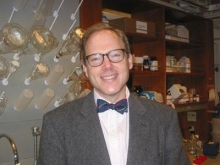David Christianson Named Repligen Award Winner

The Repligen Award for Chemistry of Biological Processes was established in 1985 and consists of a silver medal and honorarium. Its purpose is to acknowledge and encourage outstanding contributions to the understanding of the chemistry of biological processes, with particular emphasis on structure, function and mechanism. The award is administered by the Division of Biological Chemistry of the American Chemical Society. The award symposium will take place at the Fall 2013 National Meeting of the American Chemical Society (ACS) in Indianapolis.
Christianson’s research focuses partly on the structure and function of metal-requiring enzymes. His work demonstrated that the manganese-containing enzyme arginase is a drug target for sexual arousal disorders. Additional research suggests that the enzyme could be important in treating other medical conditions, including cardiovascular disease and asthma. In 2008, Christianson, Penn, and fellow researchers at Johns Hopkins University founded Arginetix, now Corridor Pharmaceuticals, Inc., to commercialize arginase inhibitors developed in Christianson's laboratory.
His research has also illuminated complex molecular mechanisms in the biosynthesis of terpenes, natural products found in all forms of life—animal, vegetable and bacterial—and including menthol, cholesterol and the anti-cancer drug Taxol. Terpenes have long been ingredients in analgesics, antibiotics and anti-cancer drugs. Christianson’s discoveries about terpene synthase structure will allow scientists to understand the first steps in the generation of more than 60,000 terpenes, and eventually to create new forms for a variety of uses.
Christianson was named a Fellow of the Guggenheim Memorial Foundation in 2006. He has also been a Searle Scholar, an Office of Naval Research Young Investigator, an Alfred P. Sloan Foundation Research Fellow and a Senior Fellow of the American Asthma Foundation. He received the 1999 Pfizer Award in Enzyme Chemistry from the ACS, and the 2006 Underwood Fellowship from the Biotechnology and Biological Sciences Research Council of the United Kingdom.





